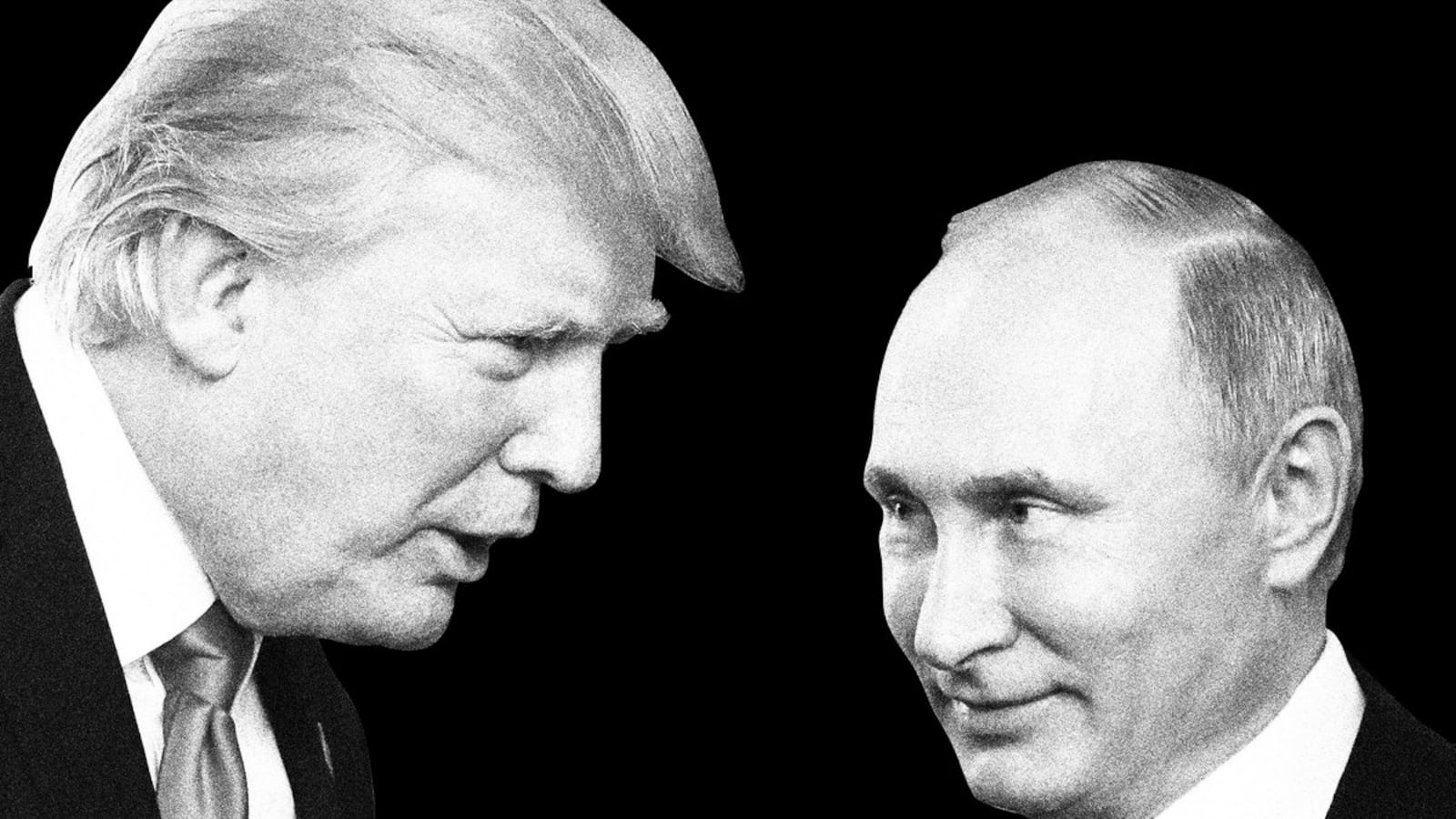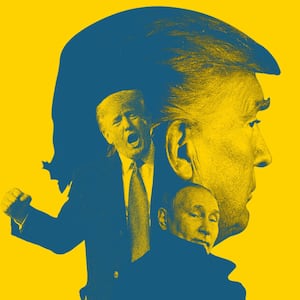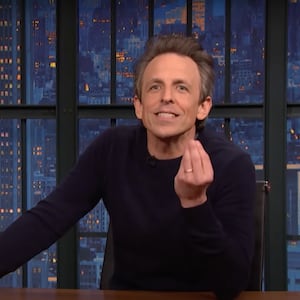What kind of sick universe is Donald Trump living in? During a Tuesday radio interview with Clay Travis and Buck Sexton, Trump had this to say about Russia’s invasion: “I went in yesterday and there was a television screen, and I said, ‘This is genius.’ Putin declares a big portion of the Ukraine—of Ukraine. Putin declares it as independent.”
A normal person might condemn Putin’s illegal and immoral invasion and the shameful propaganda that sought to justify it; Trump’s first impulse was to praise how well Putin lied about the bogus pretext.
The next night, Trump continued this ass-kissing, saying: “[Putin is] taking over a country for two dollars’ worth of sanctions. I’d say that’s pretty smart. He’s taking over a country—really a vast, vast location, a great piece of land with a lot of people, and just walking right in.”
… But other than that, Mrs. Lincoln, how was the play?
That’s right, no word about the plight of Ukrainians. No talk of moral courage or standing up against aggression. Just tacit praise for Putin’s power and devious ways.
By focusing on a minor subplot—in a way that is devoid of context—Trump buries the lede.
And sadly, Trump is not alone in this regard. His former secretary of state, Mike Pompeo, got in on the act, too, calling Putin “very shrewd. Very capable,” and adding: “I have enormous respect for him…”
Now, Joe Biden has previously called Putin “a worthy adversary.” Politicians sometimes have to say BS things like that for diplomatic purposes (ideally, not during an invasion), and besides, there’s nothing wrong with appreciating the strategic acumen of an opponent.
During World War II, General George Patton famously read Erwin Rommel’s book about infantry tactics. In the 1970 Patton film, this is portrayed when actor George C. Scott delivers the now-famous line, “Rommel, you magnificent bastard, I read your book!” It is wise to study and appreciate your enemy’s strategy and tactics. As Sun Tzu said, “Know thy enemy and know yourself…”
But it’s best if this grudging respect is not instead a thinly veiled endorsement of the enemy’s objectives.
By focusing on Putin’s savvy, Trump and Pompeo believe they can praise Putin’s invasion without technically endorsing it. This is so laughably inappropriate as to make me wonder how Trump might refer to other villainous historical figures.
… “Say what you will about Charles Manson, but he was a fantastic motivator. Leadership qualities? Off the charts. Believe me. And let’s not forget about his humanitarian work with those homeless runaways.”
… “Fidel might have been a bloodthirsty dictator, but he helped people learn to read and write.” (Okay, this one is close to a real Bernie Sanders line.)
… “Mussolini made the trains run on time.”
My favorite example of someone missing the forest for the trees is this real-life description of The Wizard of Oz: “Transported to a surreal landscape, a young girl kills the first person she meets and then teams up with three strangers to kill again.” (I’m pretty sure Trump read that description and nodded his head in agreement. After all, his assessment of Russia’s invasion of Ukraine is just as warped.)
So what explains Trump’s deranged interpretation of events? The most obvious answer is that Trump has a soft spot for authoritarians and strongmen who use violence.
This is, after all, the same guy who said of Saddam Hussein, “He was a bad guy, really bad guy, but you know what he did well? He killed terrorists. He did that so good.”
Of North Korean dictator Kim Jong Un, Trump said, “It’s incredible. He wiped out the uncle, he wiped out this one, that one. I mean this guy doesn’t play games. And we can’t play games with him.”
And of China’s massacre of pro-democracy protesters, Trump said, “When the students poured into Tiananmen Square, the Chinese government almost blew it, then they were vicious, they were horrible, but they put it down with strength. That shows you the power of strength.”
Unlike my fictional quotes about Charles Manson and Fidel Castro, these are real. And I could go on. But there’s something else, too.
This might seem like a persnickety observation, but go back to Trump’s quote at the top of this column, and you’ll notice that in the process of praising Putin, he stops to correct himself after referring to the Ukraine.
Words matter, and there is good reason to omit the definite article, but if you’re going to condone an invasion, why worry about committing such a politically incorrect faux pas?
Trump’s brain isn’t normal. He majors in the minors and minors in the majors. He fetishizes feats of strength and obsesses over “process”—how somebody does something—while downplaying the much larger question—should they be doing this in the first place?
At this point, I am sick of debating whether Trump’s praise for Putin is strategic or simply the product of a twisted mind. Either option is disqualifying.
This is the millionth reason why Trump should never again be allowed within 100 miles of 1600 Pennsylvania Avenue.
If you think Citizen Trump poses a threat to the current world order, just imagine how dangerous President Trump would be in the White House again.






